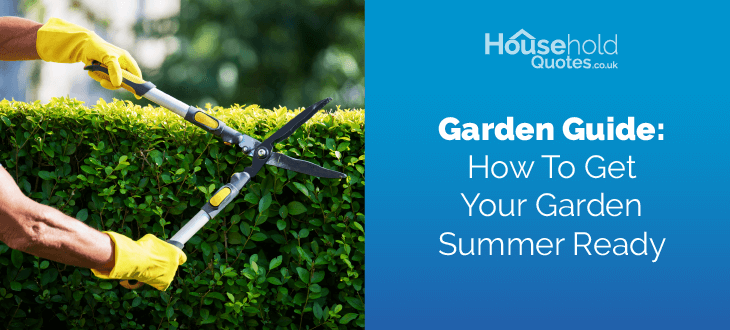- Householdquotes.co.uk
- Blog
- Garden Guide: How To Get Your Garden Summer Ready
Expert Reveals Seven Tips To Get Your Garden Summer Ready


The Summer season is just over a month away, with Britons hopeful that the warm weather won’t be far behind. Millions of people across the country will be looking forward to kicking back and relaxing in their gardens. Taking in the sunshine and enjoying the greenery surrounding them.
However, after a particularly miserable Winter and Spring, your garden may require some much-needed attention. If you’re planning on spending a lot of time outdoors then it’s best to get your garden into order as soon as possible. You don’t want to waste those first few days of warm sunshine.
So I’ve come up with my seven tips to get your garden Summer-ready. Go down the list and tick off which tasks you’ve tackled to make sure you’re prepared. Failing to address some of the issues I bring up can lead to big problems down the line.
1. Inspect your equipment
Over the Winter period, the UK saw 15% more rain than normal according to Carbon Brief. This has left a damaging impact on infrastructure and wildlife with heavy flooding, strong winds and cold temperatures.
It’s natural that over this period, some of your equipment that has been left exposed to the elements will be a little worse for wear. Give each piece of equipment a thorough inspection, making sure that it is still safe and component to use.
If it is found to be faulty, it will leave you plenty of time to get it fixed or replaced. Given we’re out of the Summer season, you might find better deals on equipment, saving you money.
2. Top-up your furniture
Garden furniture is particularly vulnerable to bad weather, paint can fade quickly resulting in an unattractive look. Top up your furniture with a bit of paint now, so when Summer arrives you are good to go.
Choose a paint low in VOCs (volatile organic compounds), as those with high VOCs are toxic to the environment. They are particularly dangerous to people who have breathing conditions such as asthma. In a garden environment where your children or pets might be running around it is best to avoid this risk altogether.
3. Clear your gutters
Blocked gutters can be a real nightmare, a range of different materials building up can result in bad odours arising. This can leave your outdoor space smelling unpleasant for yourself and any guests you entertain. The longer you leave it, the worse it will get so it’s important you act if you discover that your gutters are full.
Full gutters can cause your garden other problems, it attracts pests like birds, mice and rats which can make your outside space a scary place to be. It will also affect your plant life, as these rodents often like to feed on your plants and homegrown fruit and vegetables.
4. Give your grass some attention
One of the most stand-out features of any garden is the lawn, an uncared-for lawn can make your entire home look unpleasant. Start planting seeds now if you haven’t already to fill parts of your lawn that might be muddy messes. You can buy lawn seed for less than £10, and it only takes six to eight weeks for grass to fully grow.
Muddy patches may not be a problem, but the length might be. It’s normal for grass to overgrow during the colder months. Let's face it, not many of us want to spend our free time out in relentless British rain. Start mowing your lawn regularly, once every fortnight should be sufficient.
5. Look out for weeds and pests
In order for your grass and other plants to grow, they need to have enough access to resources like water and sunlight. Weeds can cause real concerns, they provide no food value, nutrients or visual appeal. So it’s crucial that you deal with them accordingly, spray them with weedkiller which normally takes seven days to do its job.
Pests are common in gardens, you might find rats and mice scuttering around, especially if your bins are nearby. They can cause damage to your garden by eating your plants and biting pieces of furniture and equipment. Keep them away by making sure your bins are secure and emptied regularly. Don’t leave scraps of food in your garden, and ensure there’s no way they can access your home from the outside.
6. Cut back your bushes
Bushes are another part of your garden that can overgrow during the Winter months. They can be dangerous to young children playing, as sharp wooden twigs are hidden by the bright green leaves.
A hedge trimmer is the ideal piece of equipment to use costing anywhere from £40. If this isn’t in your budget, you can use shears which will take more time but give you better control of what you’re cutting.
7. Clean your paving
After the unusually wet few months we’ve had, a lot of mud from other parts of our gardens would’ve found its way onto the paving. Use a jet wash to clear any mud, moss or other stains that are preventing that nice clear finish. If you’re planning to spend a lot of time outside this Summer then start cleaning now to avoid ugly stains on your feet and shoes.

Josh Houston is a writer at Household Quotes whose passionate about the world of renewable energy, energy saving solutions and home improvements. He specialises in providing useful tips that our readers can adopt for their own needs. His skills involve translating complex topics to something more understandable.
